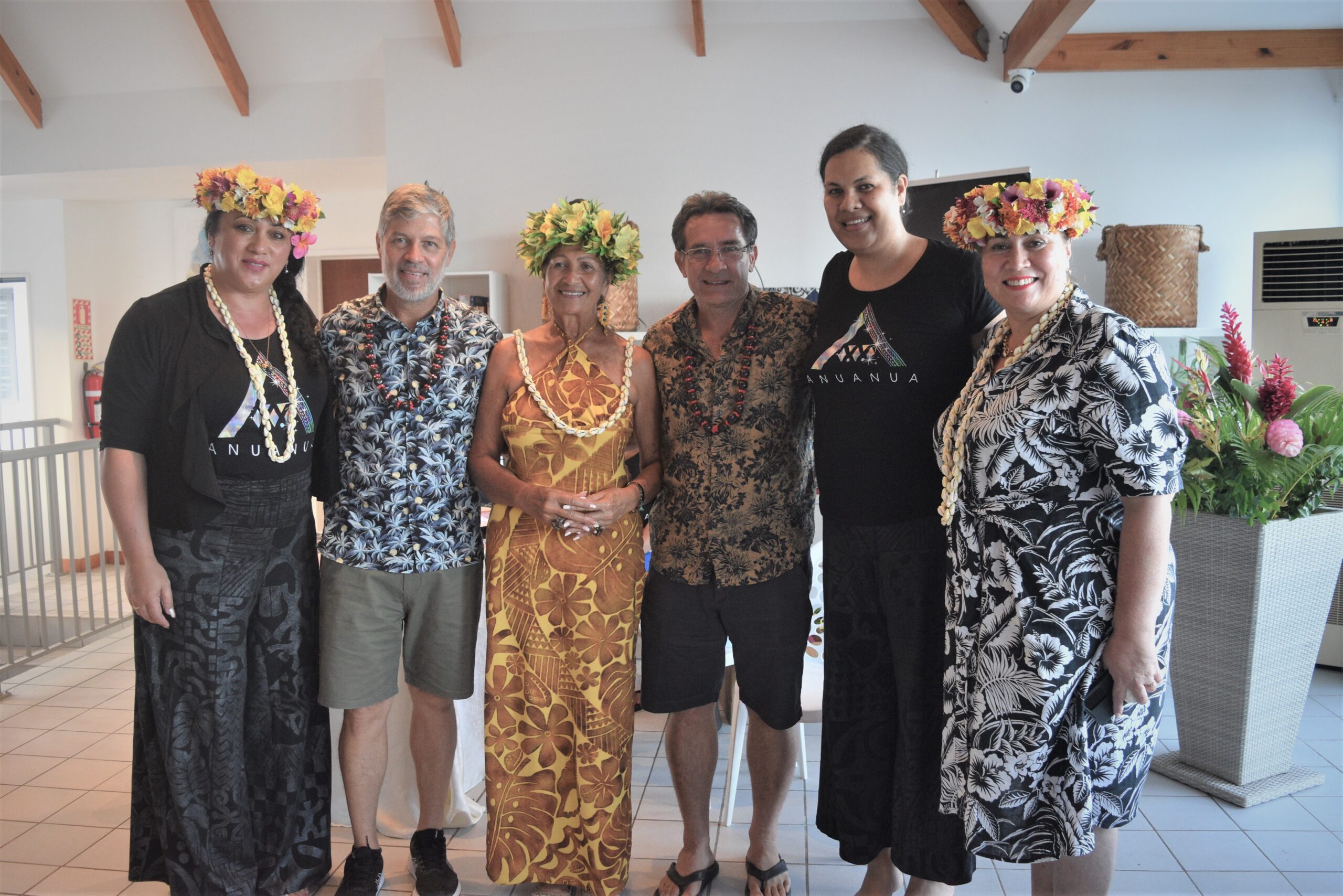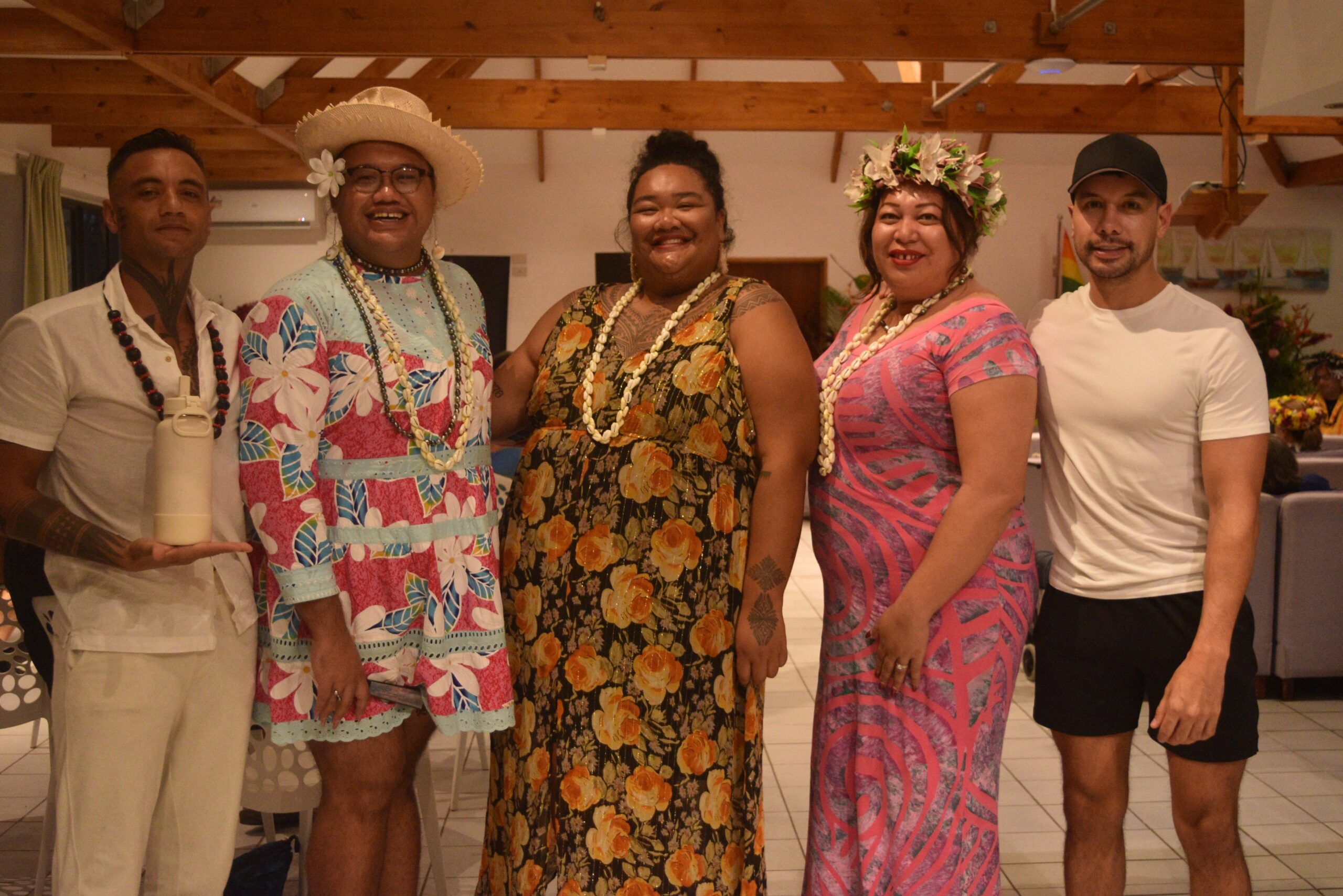Balancing rights and culture: ‘Hard Talks’ panel discusses progress and challenges
Saturday 20 April 2024 | Written by Melina Etches | Published in Features, Local, National, Weekend

The Anuanua Human Rights or Tika’anga Tangata panel for the Kai Vananga – Hard Talks conversations. From left: Phylesha Brown-Acton, Karel Terii Luciani, president of Cousine de Cousine French Polynesia, Lady Tuaine Marsters, Fletcher Melvin, Valery Wichman (moderator), and Karla Eggelton. MELINA ETCHES/24041603
Thought-provoking candid conversations on human rights or tika’anga tangata on the evolving relationship of the LGBTQI Anuanua rights in the Cook Islands shed light on the challenges, progress, and aspirations for individuals in the community and abroad.
The “Kai Vananga – Hard Talks” exploring the concept of empowerment for the Anuanua (LGBTQ+) community in the Cook Islands were held at the Muri Beach Club Hotel on Monday, in celebration of the Anuanua festival week.
The decriminalisation of same-sex relations in the Cook Islands last year serves as a springboard for examining its impact on fundamental human rights, particularly the freedom to liberty and also not being discriminated against according to sex.
Lawyer Valery Wichman was the moderator for the Tika’anga Tangata discussion that had the panel of: Phylesha Brown-Acton MNZM, Karel Terii Luciani, president of Cousine de Cousine French Polynesia, Lady Tuaine Marsters, Fletcher Melvin, and Karla Eggelton.

Discussion panellists who participated in the Anuanua Festival Kai Vananga – Hard Talks exploring the concept of empowerment for the Anuanua (LGBTQ ) community in the Cook Islands. MELINA ETCHES/24041604
Panellists looked into the perspectives of Anuanua individuals, exploring how they navigate the complexities of claiming their rights while respecting the Akono’anga Māori and Peu Māori.
Recognising the importance of both human rights and cultural heritage, they also identified strategies for promoting inclusivity, respect for diversity, and talked about the preservation of the Cook Islands Way and what this meant.
Brown-Acton is a Niuean fakafifine LGBTQ+ rights activist. In 2019, she was appointed a Member of the New Zealand Order of Merit to recognise her work with LGBTQ+ communities from the Pacific countries.
In the context of human rights and its universality, Brown-Acton says she believes that it connects with people in different ways.
“Some people are ingrained and embedded with human rights and its applicability whether it be related to legislation, and it could be just this imaginary concept to somebody that just thinks human rights doesn’t connect with them or apply to them, or they don’t understand it enough to know that it should be providing or affording them protection.
“To live a life of dignity and respect as they understand it as a concept…”
Brown-Acton explains when she thinks about human rights, she thinks of how they apply to people. This includes those who are actively working on the ground to advance human rights, as well as those who are not currently engaged in this work.
She says there are a lot of other things that are not thought about but are equally important.
“The language of human rights and all those things mean different things to different people,” says Acton-Brown.
Discrimination, prejudice, and bias do not go away “just because there is now progressive legislation in the Cook Islands”.
“Human rights is an aspect of what your government is committing to, however, these things (discrimination etc.) in our everyday lives continue to operate and exist, says Brown-Acton.
“We need to be thinking about the things that we should do to provide protective factors for our people in our communities, cultural rights, and the way that we are seen within our families.
“There are dialogue and conversations that need to be taken like this to reach the hearts and the minds of our family members to understand that just because you go to church and church is telling you this, that’s not the be-all and end-all of our relationship.”
Brown-Acton also points out that schools, education, and the way teachers asserted their prejudices or their conservative beliefs have a huge impact on children and how they progress throughout life.
“The child has a right to education; they push that aside.”
Brown-Acton believes the Anuanua community should be constantly looking at things that are relevant in their everyday lives and never lose sight that there is a lot more work to do at higher level.
Speaking about her personal journey to the United Nations in New York and Geneva, she says that sometimes sitting in those spaces she thought: “This is a waste of time.”
She would rather be in her office helping someone fill in an application form or passport form to change their gender mark.
“I’m not saying human rights is not useful, absolutely it is, we know that instrument protects us.
“But never lose sight of the things that we don’t talk about – the trauma, the pain, and the healing that many of us need today to get to that aspirational point of togetherness.”
Brown-Acton adds recognising that beyond human rights and everyday needs people need to be considerate and think about the healing that needs to happen “so that people can all together create that path to a world that is fulfilled absolutely like the anuanua, the rainbow itself”.
Wichman accepted that human rights is a box “that’s boxing us in localising, contextualising, ensuring that things are relevant and that the language that we use is important”.
Challenges faced by the Anuanua community, including social stigma, discrimination, legal barriers, and cultural norms were also acknowledged.
By openly discussing these obstacles, the panelists aim to foster a deeper understanding of the path toward empowerment within the unique context of the Cook Islands.















































